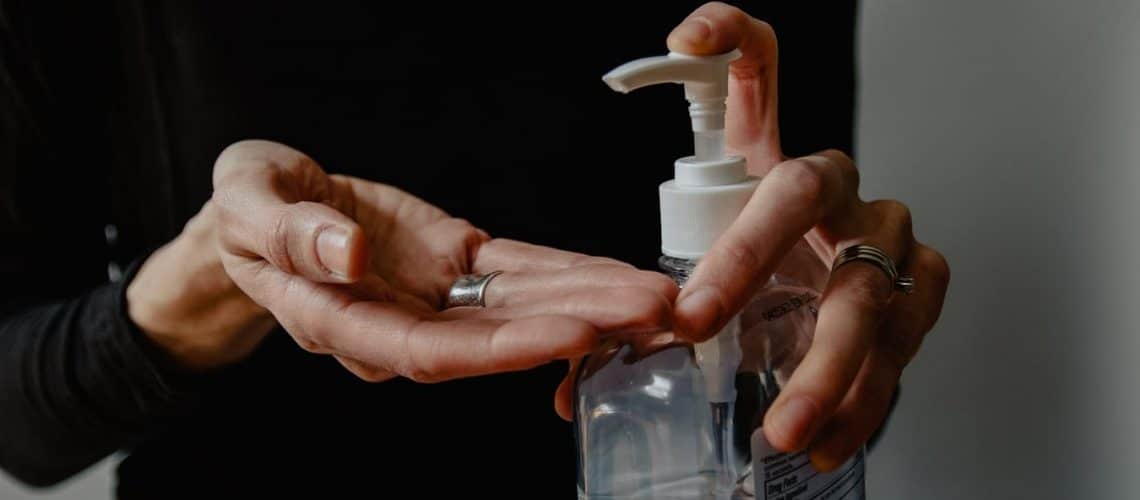Alcohol-based hand sanitizers require reapplication with each exposure to germs and can over dry the skin, trapping germs in dead skin cells. This occurs because alcohol strips away the oils in your skin that retain moisture. Alcohol-free sanitizers provide extended protection against germs.
Active Ingredient in Alcohol-free sanitizer: Benzalkonium Chloride (BZK).
Benzalkonium Chloride (BZK) is an alcohol-free antimicrobial compound that has been widely used for more than 60 years in an extremely broad range of applications. It is an excellent choice as a leave on skin antiseptic as well as a first aid antiseptic to guard against infection in minor cuts, scrapes and burns. BZK is less of an irritant than alcohol and is also more effective due to its persistent activity. Another advantage BZK has over alcohol is that it does not burn or sting when applied to a wound.
Most drugs used in OTC products are not reviewed and/or approved by the FDA but may be marketed if they comply with applicable regulations and policies. BZK is the active ingredient and operates under an FDA Monograph and its chemical properties make it a good candidate for persistent antimicrobial activity in mammalian tissue. BZK has been used in major brands for years and is fast becoming a preferred choice of customers over alcohol-based products. Independent lab testing has substantiated this and specifically shown our formula to be effective against Staph, MRSA, C.diff, E Coli and Salmonella, as well as Polio virus which the CDC uses as a comparison to determine effectiveness against Ebola.1
Effectiveness
Benzalkonium chloride based “leave on” Hand Sanitizers have demonstrated efficacy in real world environments. When evaluated in Elementary Schools where the importance of proper hygiene practices, especially hand washing, is taught and emphasized, the use of non-alcohol benzalkonium chloride based “leave on” instant hand sanitizers reduced illness absenteeism 30-40% in double-blind, placebo-controlled studies versus hand washing alone.2
Efficacy and Residual Activity
Alcohol-based hand sanitizers stop working the instant they dry. The leading manufacturer of alcohol-based hand sanitizers claims their product kills 99.99% of most common germs that may cause disease in as little as 15 seconds. Alcohol-based hand sanitizers dry in 8-10 seconds, and fall below the efficacious concentration of alcohol in seconds. It has been reported that alcohol-based hand sanitizers offer no residual protection. Benzalkonium Chloride based hand sanitizers dry fast, but 10-15 seconds slower than alcohol-based hand sanitizers allowing more than the minimum contact time for complete efficacious coverage. Additionally, Benzalkonium Chloride based hand sanitizers provide persistent protection. Gelled alcohol-based hand sanitizers actually become less effective with repeated use and make the skin dirtier, not cleaner due to removal of protective natural skin oils and entrapment of dead skin cells by the polymer thickeners used in the gelled alcohol-based products.
Safety
If you have any more questions on alcohol versus non-alcohol and their benefits don’t be afraid to ask but know that non-alcohol hand sanitizers and Benzalkonium Chloride are proven to be very effective. Benzalkonium Chloride based hand sanitizers are non-flammable. Internet searches for alcohol-based hand sanitizers and fire will produce multiple hits. Flash fires have been associated with use of alcohol-based hand hygiene products and can have potentially severe consequences.3
Questions?
If you have any more questions on alcohol versus non-alcohol and their benefits don’t be afraid to ask but know that non-alcohol hand sanitizers and Benzalkonium Chloride are proven to be very effective.





